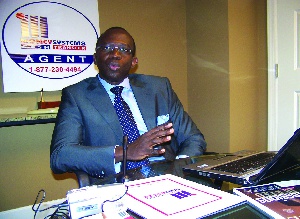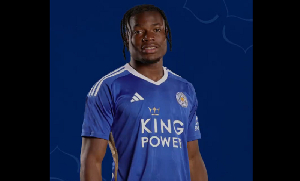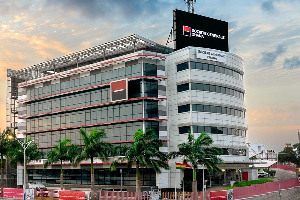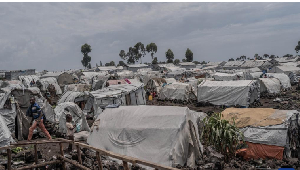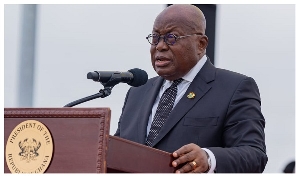Diasporia News of Monday, 17 December 2007
Source: Bright Boateng for The Gold Star Herald/GHP
Patronize African businesses -Awuah-Darko
Interview with CEO of Money Systems International, Kingsley Awuah-Darko
What is Money Systems focus?
We are currently focusing on international Money transfer business where we are providing high quality-low cost international money transfer for Africans living in the Diaspora. We are targeting about 20 African countries.
What change as far as the market to the need for money transfers services?
I think fundamentally when you look at the cost of money transfers at the moment they are too high. The market for such industry and the efficiency that is currently available the cost international money transfers can be reduced that’s part of the reasons why we’ve come into the business.
What sorts of efficiencies can be gained to impact the transaction cost of money transfers?
The efficiencies include technology, training of the people who deliver customer service at the receiving and the sending end. Compliance is also a big issue in the post 911 environment. If you are able to put together a low-cost operation, which is what we have done based our ability to leverage our competitive technology, the M-System. You do get yourself in a position where you can provide a high quality service at a very low price and that is what we have successfully done in Europe and that’s what we are going to do in the U.S.
What is your competitive advantage over your peers in the industry, that enables your company to achieve these efficiencies?
First and foremost our technology, I do not want to give away any intellectual property. But whereas our competitors are able to distribute their remittances service in fifteen (15) or (10) minutes, we do it instantly. And that is based on how our application, the M-System has been developed.We are also competitive on price and customer service. I give you a typical example; our slogan is "Better, Faster, and cheaper." Now it could sound ridiculous to somebody who would say how can you, a money transfer company that started five years ago be better than companies that were started fifty or hundred years ago?’ But it’s very simple, if you look at it for example, like a 100-meter sprint, you have five athletes, one of them is going to come first and you are going to judge them by their ability to be first based on speed. Now, if you compare this analogy to remittances, we are able to deliver $100 into any of our fourteen (14) countries fro $7. Our competitors at best can do it at $9 or $10. So looking at them from this perspective, we are better because we provide the same service at a lower price and our competitors and our customer service is known to the industry as above average. Actually, we will probably be rated as number one, if anybody was doing rating in the money transfer industry.
Are there any other Africans in this industry?
The industry has been operated by Africans who focus on the business by corridor basis, that is, you find an African, a Ghanaian, Nigerian or a Kenyan who focus for example on a particular state, say Washington D.C. focusing on the Ghana market, which is per corridor arrangement.We have now gotten the first, [and I am proud to say] African money Transfer Company to have a global footprint. And some of these things have been done because our vision has been to provide money transfer services to the African community, giving it an African flavor. And these are the reasons why we have applied ourselves to this industry in this manner.
Has being African-owned given you any advantages or otherwise?
It has given us both. But we cannot complain about our advantages. It has given us disadvantages in the sense that you don’t operate a money transfer in isolation. It is done using a number of service providers. You work with banks in Africa, for example, and it has been a novelty for African financial institutions to hear that an African company is able to provide them with such a service.I remember when we went to sign up with a bank in Morocco, for example, their main concern was not that we were an African business but they wanted us to present ourselves as a European business so they were asking for us to bring forward our business registration in Europe. We are registered in Europe and we kept telling them that we were an African business. That is what we are. Yes, we operate in Europe, and yes, we operate in North America, but we are an African business. So there have been those kinds of stereotypes whereby people are only expecting, I guess, minerals and raw material from Africa. They are not expecting financial services to be provided by an African business. For that we have had to sort of go against the grain.
The advantages…
I started conceptualizing the business when I was a migrant living in London and studying for my Master of Business Administration (MBA) in England. And I realized at the time that both Western Union and MoneyGram had no African features or Africanization of any of their businesses. We were going into Turkey-owned shops or Arab, or Middle Eastern-owned shops to do a money transfer. It was then that I realized that Africans were comfortable doing business with each other, because we speak our own languages. And we have our own way of doing any business. So in terms of putting together our business concept, we made it more of an African concern, and then we took the product to African stores. Western Union and Money only started going to African stores only in the recent past. It is something that they have learned form us. You were able to go and do a Western Union or Money Gram in non-African shops. This is something that they have copied. This is something that we introduced that they have copied and it’s working very well for us.
As far as your interactions with your customers, do you feel that being an African business that you have a higher huddle to overcome, in their minds?
Yes, you do. And, like every business enterprise, every human being, everything worthy of pursuit you start from somewhere. You have to crawl before you walk, and before you run. When we started out we did not even feature any brand, we just worked through African stores in Europe and built up our relationships and our expertise. So as for this question I can answer it from both the European and then the American perspective.From the European perspective, we have overcome perception all our huddles. We have a strong brand and we have a strong presence in the high street. From the American perspective, we are new and we are now building up that reputation. And at the beginning of that process we have had a couple of differences that the organization has had to adjust to. For example, the time zone differences between the United States and African countries have provided some initial operational huddles that we have had to overcome. But yes, there is definitely a perception problem. The issue is ‘how do you use it to your advantage,’ and I think we have managed to do that quite well.
What is your overall assessment of Africans’ patronage of your services, and what impressions do you get from them as far as problem resolution?
I think there is a certain level of, and I am sorry to use this word “colonialism” that exist that exists in the African psyche, which is far more deep-seated than we would like to admit. When people know that the business is an African business, when they have a problem, the way they respond to customer services issues, even when happens to be their own fault, is significantly different.We have an agent association so we know the complaint that other companies had with regards to customer service. And we also know the reaction of what the customers have when, for example, MoneyGram or Western Union does not deliver a transaction, because of any number of reasons. Because these two institutions are well-branded people tend to accept whatever they are told. And it’s also because they have a posture of subordination to these institutions because they perceived them to be western and therefore better institutions. They perceive them to superior to even them as Africans.
Whenever they have had customer service issues with us, in the initial stages, I see a disproportionate reaction. And when you speak to the customers and you really get down to it, you find out that they have an innate confidence in the fact that the companies that they are working with are western. That is the burden of being a pioneer. And it’s a burden that we accept because we have to start from somewhere. And if we are going to erase the negative perception of ourselves, somebody is going to have to start. And that is what we are here to do.
How do you overcome this innate self-hatred?
There are a number of ways, and it’s not going to go away overnight. But I think the most important step is to provide a superior services. That is what we are doing and that is what we are focused on doing, because if somebody tries your business and finds that it is good or better, than your competitors, then all of a sudden you have then created an example of a successful African enterprise.And if you have more and more of those examples, you would have as a race gotten far ahead. It is a big deal in America that Barrack Obama is standing for President and is making some headway. The point is, there are not many of such examples, so he [Obama] comes across as a superstar. It’s not even as big a deal that because Hillary Clinton is a woman that a woman is standing for president, as much as it is that a black man is running for president, because we do not have many examples.
As far as the community is concerned, what is your advice regarding the support and patronage of black businesses and institutions in general?
I think the community owes it to itself for a number of reasons. And for me the most important reason is that we are able to communicate better with ourselves. I could go on and put in some altruistic things like ‘we are employing Africans; we are booking our income in Africa and we are generating revenue, etc, in Africa.’ But for me, those are not important, because at the end of the day, we are a business that is here to make profit just like any other organization. But our involvement in the community is instinctive. We do not have to ‘go to the community,’ we are the community. So the things that Money Systems does for the community are instinctive. We don’t have to sit down and call a meeting of various African communities and tell them, ‘this is what we are thinking of doing,’ etc. We are in the community, and we know our problems. We know our needs and our foundation, which is being launched in 2008, will prove the difference it makes when you do business with an African company, because all the benefits that we have that we are giving to the people are being reinvested into the African community. They are African solutions and they are very simple; and guess what, they are not as expensive as it will be for a non-community member to take part.The African community is divided into different parts. We do not have much experience in America but I will give you a European experience. The Nigerians are with us and they work with us. The Ghanaians initially started off skeptical and adopted a wait-and-see attitude. The Senegalese work with us and even though they were very bureaucratic, French bureaucracy is traditional, so it varies from community to community. The Kenyans are wonderful and they have also taken on over service adequately.
But I think as a broad generalization, when they realize that the company is inspired by an African, there is a certain level of support that you naturally tend to get, because at the end of the day we strive for the independence of Africa. We wanted to see African institutions grow so that they can represent African interests. And it’s something that our company, by its nature, design and breadth, seeks to do to represent the best interest of the African.

